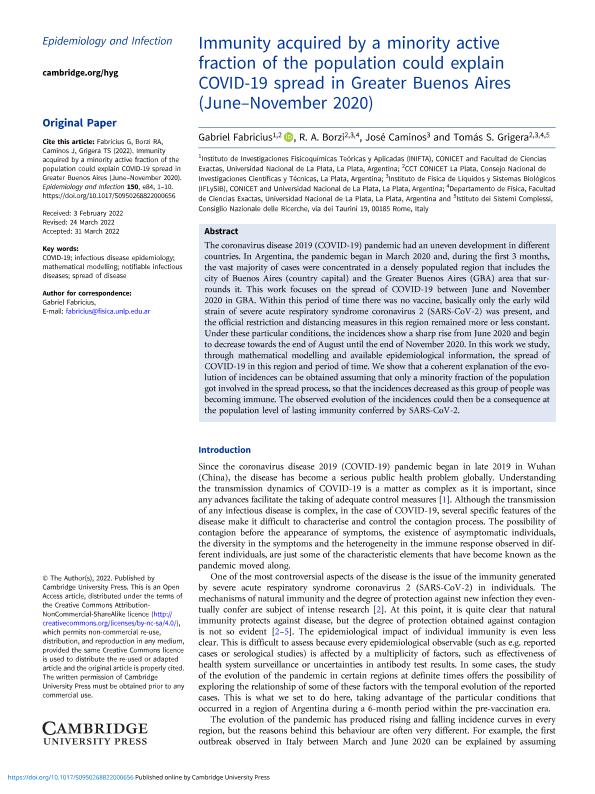Artículo
Immunity acquired by a minority active fraction of the population could explain COVID-19 spread in Greater Buenos Aires (June-November 2020)
Fecha de publicación:
04/2022
Editorial:
Cambridge University Press
Revista:
Epidemiology and Infection
ISSN:
0950-2688
Idioma:
Inglés
Tipo de recurso:
Artículo publicado
Clasificación temática:
Resumen
The coronavirus disease 2019 (COVID-19) pandemic had an uneven development in different countries. In Argentina, the pandemic began in March 2020 and, during the first 3 months, the vast majority of cases were concentrated in a densely populated region that includes the city of Buenos Aires (country capital) and the Greater Buenos Aires (GBA) area that surrounds it. This work focuses on the spread of COVID-19 between June and November 2020 in GBA. Within this period of time there was no vaccine, basically only the early wild strain of severe acute respiratory syndrome coronavirus 2 (SARS-CoV-2) was present, and the official restriction and distancing measures in this region remained more or less constant. Under these particular conditions, the incidences show a sharp rise from June 2020 and begin to decrease towards the end of August until the end of November 2020. In this work we study, through mathematical modelling and available epidemiological information, the spread of COVID-19 in this region and period of time. We show that a coherent explanation of the evolution of incidences can be obtained assuming that only a minority fraction of the population got involved in the spread process, so that the incidences decreased as this group of people was becoming immune. The observed evolution of the incidences could then be a consequence at the population level of lasting immunity conferred by SARS-CoV-2.
Archivos asociados
Licencia
Identificadores
Colecciones
Articulos(IFLYSIB)
Articulos de INST.FISICA DE LIQUIDOS Y SIST.BIOLOGICOS (I)
Articulos de INST.FISICA DE LIQUIDOS Y SIST.BIOLOGICOS (I)
Articulos(INIFTA)
Articulos de INST.DE INV.FISICOQUIMICAS TEORICAS Y APLIC.
Articulos de INST.DE INV.FISICOQUIMICAS TEORICAS Y APLIC.
Citación
Fabricius, Gabriel; Borzi, Rodolfo Alberto; Caminos, José María; Grigera, Tomas Sebastian; Immunity acquired by a minority active fraction of the population could explain COVID-19 spread in Greater Buenos Aires (June-November 2020); Cambridge University Press; Epidemiology and Infection; 150; 4-2022; 84-84
Compartir
Altmétricas




